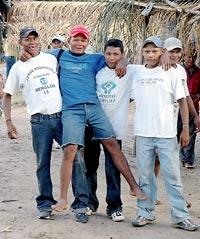Leader's suicide signals bleak future for nomads in Colombia

BOGOTÁ, Colombia — Not long ago, Mao-be lived in the jungle with Colombia's last nomadic Indian tribe. A hunter-gatherer, he and his brethren moved every few weeks, fishing, collecting fruits and hunting monkeys with poisonous darts from a blowpipe.
When his people were forced from the jungle two years ago by leftist rebels, it fell to Mao-be, the only member of the Nukak Maku who spoke good Spanish, to serve as his tribe's intermediary in the modern world.
The responsibility proved overwhelming. He became despondent over their suffering, frustrated that he could not end their exile or provide them with enough food, clothing and shelter. He ended his life this month by swallowing a toxic herb.
"Mao-be couldn't help his people," explained Javier Maldonado, a doctor who works with the tribe. "He couldn't get them food or clothes and the people blamed him for that."
The tribe's future is bleak.
Uprooted by Colombia's half-century-old civil conflict and forced into camps where their immune systems are exposed to unfamiliar germs, a third of the 200 Nukak who left the jungle are falling ill, according to Survivor International, a London-based humanitarian group.
But suicide is uncommon in the tribe, according to Jorge Restrepo, an anthropologist who has studied the Nukak. He says Mao-be's death is "a clear signal of alarm."
In August, the government transferred the tribe from makeshift shacks surrounding San Jose del Guaviare, a small town in fertile lowlands southeast of Bogotá, to Puerto Ospina, a nearby village bordering dense jungle.
But this jungle was not part of the tribe's ancestral homeland. At 49,400 acres, it was just 2 percent of their homeland's size. And it has been inhabited by rebels, according to humanitarian groups.
In August, Mao-be said he and his brethren had no plans to return to nomadic life — they "are tired of walking," he said. But, he said at the time, they did want a home and feared coming across the rebels.
Some stayed in Puerto Ospina, hoping to survive on government aid. Government welfare agency Social Action has been spending about $4,300 a month providing them with health care and delivering coffee, lentils and rice — a strange new diet for the Nukak.
The rest of the Indians returned to the camps on the edge of San José del Guaviare, where their nomadic ways are turning sedentary.
"Most of them have stopped hunting and survive mainly off the food we give them," said Ramon Martinez of Social Action.
The tipping point for Mao-be may have been when a 10-year-old boy died of a respiratory infection. He committed suicide shortly thereafter.
When Mao-be was alive, he often sat in a restaurant sipping coffee, clad in a baseball cap, soccer jersey and jeans.
He was believed to be in his 20s when he died but there is no way to be certain. The Nukak do not keep track of time as most people do — a year is a foreign concept to them.
Government officials fear the Nukak face slow extinction outside the jungle. Many want to rejoin the estimated 300 Nukak still living in their ancestral lands, a giant reserve of about 2.3 million acres that borders Brazil.
The government says it will not prevent the Nukaks from returning, but is unlikely to offer either transportation or security.
"Nobody knows for sure what we must do," said Maldonado, the doctor. "But we must do something to help them."